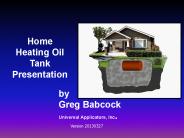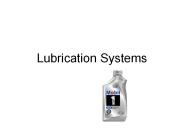Oil Tank Detection PowerPoint PPT Presentations
All Time
Recommended
In the realm of property management, the significance of safe oil tank removal cannot be overstated, particularly in a state like New Jersey. A-1 Oil Tank Removal, NJ, emerges as a key player in addressing the environmental and financial risks associated with aging or deteriorating underground oil tanks.
| PowerPoint PPT presentation | free to download
In the realm of homeownership, peace of mind often stems from knowing that your property is safe and secure. Yet, lurking beneath the surface, unseen threats like oil tank leaks can quietly jeopardize both your property and the environment. Enter Simple Tank Services, your trusted ally in safeguarding your home against such risks through comprehensive soil testing for oil tank leaks.
| PowerPoint PPT presentation | free to download
Planning to sell your property in North Vancouver? Ensure that you have no oil tank on your property. Hire oil tank detection services from West Coast Tank Recovery today! Get expert assistance.
| PowerPoint PPT presentation | free to download
In the realm of homeownership in New Jersey, the presence of underground oil tanks can be a hidden concern, potentially leading to environmental and financial ramifications. Simple Tank Services emerges as a beacon of expertise, offering essential underground oil tank inspection services to safeguard homes and the environment.
| PowerPoint PPT presentation | free to download
In the heart of New Jersey, the past often lurks beneath the surface, quite literally. Many homes and properties in the Garden State have buried oil tanks, remnants of a time when heating oil was the primary source of warmth during harsh winters. While these tanks may have served their purpose in the past, they can become ticking environmental time bombs if not handled properly. That's where Simple Tank Services, a beacon of environmental responsibility, comes into play.
| PowerPoint PPT presentation | free to download
It is the skills & experience of a professional Oil Tank Detection and Removal Expert like West Coast Tank Recovery that satisfactory service is guaranteed.
| PowerPoint PPT presentation | free to download
West Coast Tank Recovery is a reliable residential and commercial oil tank removal and contaminated soil remediation in Vancouver. To discuss your oil tank removal requirements, call at 604-628-8786.
| PowerPoint PPT presentation | free to download
Now that 2024 is here, it is more important than ever to keep the home heating oil tank maintained. The efficiency of your home heating oil tank and system is made possible by a number of recently developed technologies as well as environmental concerns.
| PowerPoint PPT presentation | free to download
Home Heating Oil Tank Presentation by Greg Babcock Universal Applicators, Inc. Version 20130327
| PowerPoint PPT presentation | free to download
Owned by two Vancouver entrepreneurs, West Coast Tank Recovery Inc. offers comprehensive solutions for residential and commercial oil tank removal. Our team is highly specialized in the detection and removal of above and underground oil tanks and in the remediation of contaminated residential and commercial properties. Call us on 604 628 8786 or visit us at : www.wctankrecovery.net
| PowerPoint PPT presentation | free to download
In the realm of environmental safety and maintenance, the significance of soil testing for oil tank leaks cannot be overstated. With environmental concerns looming large and the necessity for responsible handling of hazardous materials becoming increasingly vital, understanding the process and its implications is paramount. At Simple Tank Services, we prioritize environmental consciousness and safety, making soil testing a cornerstone of our services.
| PowerPoint PPT presentation | free to download
Underground oil tanks have long been fixtures on many properties, providing a convenient storage solution for heating oil. However, as time passes, these tanks can deteriorate, leading to leaks that pose significant environmental and financial risks. Understanding the implications of these leaks and the essential role of specialized oil tank removal companies and services becomes paramount for property owners.
| PowerPoint PPT presentation | free to download
Oil tanks have been a prevalent feature in New Jersey properties for decades, but as time progresses, the need for their safe removal has become increasingly vital. Whether due to aging tanks, environmental concerns, or property renovations, the process of oil tank removal in NJ is a critical step for homeowners and businesses alike.
| PowerPoint PPT presentation | free to download
Residential oil tank removal is a task that requires expertise and precision. Whether you're doing it as a precautionary measure or in response to a detected issue, it's a vital process to ensure the safety of your property and environment. By selecting a reliable oil tank services company in NJ, you're ensuring that the task is executed seamlessly and up to code. It's not just about removing an old tank; it's about safeguarding your home and the community's future.
| PowerPoint PPT presentation | free to download
Having an unused underground oil tank installed in your property contaminates the soil and needs to be removed to follows related laws and guidelines. Here is how calling for an oil tank removal expert can help.
| PowerPoint PPT presentation | free to download
When it comes to maintaining a safe and healthy environment, soil testing plays a crucial role, especially in New Jersey, where residential and commercial properties often contend with the remnants of old oil tanks. A-1 Oil Tank Removal NJ, a trusted name in the industry, offers comprehensive soil testing services to ensure your property is free from harmful contaminants and complies with state regulations.
| PowerPoint PPT presentation | free to download
Buried oil tanks are a relic of older heating systems, common in many homes built before the shift to modern alternatives. While once a standard, these tanks now pose a potential threat due to corrosion, leaks, and environmental hazards. Identifying and mitigating these risks is crucial for homeowners to safeguard their properties and the surrounding environment.
| PowerPoint PPT presentation | free to download
For New Jersey homeowners with a decommissioned heating oil tank, removal is a necessary step. But navigating the process can be confusing, especially when it comes to choosing the right company. Avoiding some common mistakes can save you time, money, and unnecessary headaches.
| PowerPoint PPT presentation | free to download
Oil tanks have long been a crucial component of homes that rely on oil for heating. However, as environmental awareness grows, many homeowners are opting to remove their oil tanks to prevent potential soil and groundwater contamination. In this guide, we'll delve into the process of oil tank removal, addressing its importance, potential risks, and the steps involved.
| PowerPoint PPT presentation | free to download
The unseen dangers that lie beneath our feet can often be the most insidious. One such danger is the potential for oil tank leaks, which can contaminate the soil and groundwater, leading to long-lasting environmental and financial consequences. Soil testing for oil tank leaks is a critical step in preventing and addressing these issues, safeguarding our surroundings, and preserving the integrity of our ecosystem.
| PowerPoint PPT presentation | free to download
In the serene township of West Orange, homeowners are increasingly recognizing the significance of soil testing, especially when it comes to properties that have housed oil tanks in the past. A-1 Oil Tank Removal NJ, a trusted name in environmental solutions, sheds light on the vital role that soil testing plays in ensuring a safe and contamination-free environment.
| PowerPoint PPT presentation | free to download
Do you know what we do if our oil tank has been leaked? Check out this post to learn more.
| PowerPoint PPT presentation | free to download
Residential oil tanks have been a common feature in homes for decades, providing heat and fuel for countless families. However, as time passes, these tanks can deteriorate, leading to leaks, environmental hazards, and property value depreciation. In this comprehensive guide, we'll explore the importance of residential oil tank removal, the process involved, and why it's essential for homeowners.
| PowerPoint PPT presentation | free to download
If you have an old oil tank buried underground on your property, it's better to have the same removed with the help of a professional company. The cons of owning a property with a buried oil tank seem more obvious; thus, it's good to have the oil tank removed soon.
| PowerPoint PPT presentation | free to download
Do you know what we do if our oil tank has been leaked? Check out this post to learn more.
| PowerPoint PPT presentation | free to download
To update technical aspects of the Regulations that are outdated ... TMB drafts Regulations to comply with EPACT and new technology ...
| PowerPoint PPT presentation | free to view
Oil tank remediation is a critical process for ensuring environmental safety and sustainability, especially as we become more aware of the ecological impacts of oil spills and leaks. This guide will walk you through eco-friendly practices for oil tank remediation, helping you manage and remediate oil tanks in a way that minimizes environmental harm.
Tank Intelligence for better tank gauging
| PowerPoint PPT presentation | free to view
Underground storage tanks (USTs) are integral components of many properties, serving as containers for a variety of substances, notably oil-based products. While these tanks are essential for storage purposes, they can present unique challenges and considerations, particularly when it comes to removal. Understanding the dynamics of properties housing underground storage tanks, and the necessity of professional services like an oil tank removal company, is crucial.
| PowerPoint PPT presentation | free to download
oil & gas sector ... sampling as per mdg-2001 dip tape bottom sampling thief stock-loss very important factor directly affecting the company s profitability .
| PowerPoint PPT presentation | free to view
From the delivery services of fuel in summers and winters to the different steps for the heating oil delivery process for homes and businesses this article will cover it all!
| PowerPoint PPT presentation | free to download
Are you looking for high quality tank level sensor? Icon process controls offers corrosion resistance, reliable, chemical resistance, easy to install and all plastic design level sensors for industrial flow and level measurement equipment. Browse our website for more product details.
| PowerPoint PPT presentation | free to download
When it comes to ensuring the safety and health of your property in New Jersey, a soil inspection is an invaluable tool. This is particularly true in areas with a history of underground oil tanks or environmental hazards.
| PowerPoint PPT presentation | free to download
use large volumes of cheap materials. Detection techniques: radiochemical experiments ... colors time of every hit PMT corrected for photon flight time ...
| PowerPoint PPT presentation | free to view
Mention the kinds of injection ... The Lower Calorific Value is a measure of the heat energy available and does not include the heat energy contained in steam ...
| PowerPoint PPT presentation | free to view
You should remove abandoned underground oil tankers immediately if they are on your property. To detect and have them removed, contact West Coast Tank Recovery.
| PowerPoint PPT presentation | free to download
UNDERGROUND STORAGE TANK
| PowerPoint PPT presentation | free to view
The field of storage tank design and technology has seen remarkable advancements in recent years, driven by the need for improved safety, efficiency, and environmental responsibility. This presentation delves into the cutting-edge innovations transforming the industry, from the development of advanced composite materials that offer superior durability and corrosion resistance to the integration of smart technologies like IoT for real-time monitoring and predictive maintenance.
| PowerPoint PPT presentation | free to download
Describes the jet engine oil system
| PowerPoint PPT presentation | free to download
Tank Consultants, Inc. 4333 West 21st Street Tulsa, Oklahoma 74107-3444 918-583-3968 Telephone 918-583-3966 Fax www.tank-consultants.com SPCC Tank Integrity Testing ...
| PowerPoint PPT presentation | free to view
They may accept DIY oil. Most are county agencies. ... Aggregation points bulk one owner's oil (and DIY, of course). Must meet generator requirements. ...
| PowerPoint PPT presentation | free to view
In this interesting blog, we will discuss the different types of heating oil and what are their advantages and disadvantages. For more detail visit website..
| PowerPoint PPT presentation | free to download
| PowerPoint PPT presentation | free to view
Any possibilities of leaks and malfunctions are instantly decreased when combined with regular inspection and maintenance from your local Heating Oil East Bridgewater, MAspecialist.
| PowerPoint PPT presentation | free to download
Multi-phase, multi-year project to comprehensively review and update the oil ... Vaulted, self-diked, and double-walled tanks are defined in regulation, and ...
| PowerPoint PPT presentation | free to view
Used oil can be returned to the market in a variety of forms as part of a cycle ... Can you see their haulers permit - What insurances do they carry. 12. Oil and Water ...
| PowerPoint PPT presentation | free to view
DEQ - Tanks used by FUEL DEALERS to dispense GASOLINE AND DIESEL. EPCRA - Reporting Requirements ... DISPENSING GASOLINE OR DIESEL. Jet Fuel is defined as ...
| PowerPoint PPT presentation | free to view
The main unification process is called catalytic reforming and uses a catalyst to combine low weight naphtha into aromatics which are used in making chemicals and in ...
| PowerPoint PPT presentation | free to download
THE WYOMING Storage Tank Program
| PowerPoint PPT presentation | free to view
The different terms “fuel oil” and “heating oil” are typically used to describe home heating oil. This is a properly concerned option for various heating processes in homes and businesses.
| PowerPoint PPT presentation | free to download
The Fossil Fuels: Oil Lecture #4 HNRS 228 Energy and the Environment Why is the term, FOSSIL FUEL used for coal, oil, gas and lignite? A Because they all contain fossils.
| PowerPoint PPT presentation | free to download
These tests are Well logging, Drill-stem testing, ... An oil well can produce at least 1,500 tons of toxic drilling muds which are dumped into rivers, ...
| PowerPoint PPT presentation | free to download
The Fossil Fuels: Oil Lecture #4 HNRT 228 Energy and the Environment Why is the term, FOSSIL FUEL used for coal, oil, gas and lignite? A Because they all contain fossils.
| PowerPoint PPT presentation | free to download
Eliminate waste oils
| PowerPoint PPT presentation | free to view
... (8.523) JP5 - 14.667 (14.960) JP8, JPTS - 23.561 (26.148) Total - 47.528 (49.631) [AVGAS - 0.005] (0.002) Source: DEFENSE LOGISTICS ...
| PowerPoint PPT presentation | free to view
Monthly Visual Inspections ... 100 ft from any property line that is or can be built upon ... 660 -750 gal To Property 10ft To Building 5 ft ...
| PowerPoint PPT presentation | free to view
























































